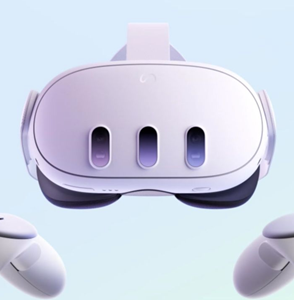The Dawn of Holographic Reality: Meta's Orion Glasses Unveiled
September 27, 2024, 10:02 pm
In a world where technology often feels like magic, Mark Zuckerberg just pulled back the curtain. At Meta Connect, he introduced Orion, a prototype of holographic glasses that could redefine our interaction with reality. Imagine a device that overlays digital elements onto the physical world, merging the two realms seamlessly. This is not science fiction; it’s the next step in augmented reality.
Orion is more than just a pair of glasses. It’s a portal. A lightweight device, weighing in at just 98 grams, it promises to change how we perceive our surroundings. The glasses feature a transparent display powered by microLED technology, allowing users to see holograms floating in their environment. This isn’t merely about viewing; it’s about interaction. Users can engage with these holograms through gestures or voice commands, thanks to a neural interface wristband that tracks thoughts and movements.
Zuckerberg’s vision is ambitious. He aims to create a world where digital avatars coexist with real people. Picture this: you’re in a room, and a life-sized hologram of a friend appears, ready to chat. You can answer calls, play games, or even collaborate on projects, all while remaining aware of your physical surroundings. It’s a dance between the real and the virtual, a blend that could enhance productivity and entertainment alike.
The Orion glasses are designed to be intuitive. They utilize a system of seven cameras to understand the environment, tracking eye movements and head positions. This technology allows for a fluid experience, where digital elements respond to your actions in real-time. The potential applications are vast. From virtual meetings that feel more personal to immersive gaming experiences, the possibilities are limited only by imagination.
But this is just the beginning. Zuckerberg acknowledges that Orion is still a work in progress. The prototype is currently in the hands of select testers, and Meta is focused on refining the display, reducing size, and lowering costs. The goal is to make these glasses accessible to the masses. Zuckerberg likens Orion to a time machine, suggesting that it could transport users to a future where digital and physical realities are indistinguishable.
The introduction of Orion ties into Meta’s broader strategy for smart glasses. Last year, the company launched Ray-Ban Meta AI smart glasses, which exceeded sales expectations. This success has fueled Zuckerberg’s ambition to keep innovating. He envisions a future where these glasses are not just tools but companions, enhancing daily life through AI integration. Upcoming updates promise to make interactions with Meta AI more natural, allowing users to converse without the need for wake words.
However, challenges remain. The cost of production is a significant hurdle. Zuckerberg has hinted that while the technology is promising, making it affordable for consumers is crucial. The path to market is fraught with obstacles, but the potential rewards are immense. If successful, Orion could usher in a new era of connectivity and interaction.
The excitement surrounding Orion is palpable. At Meta Connect, the atmosphere buzzed with anticipation. Attendees marveled at the possibilities, envisioning a future where holograms are as commonplace as smartphones. The concept of digital avatars becoming part of our daily lives is thrilling. It’s a leap into a new dimension of communication and creativity.
As we stand on the brink of this technological revolution, it’s essential to consider the implications. How will our relationships change when we can project ourselves into any space? What does it mean for privacy and personal interaction? These questions linger in the air, waiting for answers as we move forward.
Zuckerberg’s vision is clear: this is just the beginning. Orion represents a significant step toward a future where augmented reality is woven into the fabric of our lives. It’s a bold move, one that could redefine how we connect, work, and play. The journey ahead is uncertain, but the destination promises to be extraordinary.
In conclusion, the unveiling of Orion at Meta Connect marks a pivotal moment in the evolution of technology. It’s not just about glasses; it’s about a new way of seeing the world. As we embrace this new reality, we must remain vigilant, ensuring that the technology serves us, enhancing our lives without overshadowing the human experience. The future is bright, and with Orion, it’s also holographic.
Orion is more than just a pair of glasses. It’s a portal. A lightweight device, weighing in at just 98 grams, it promises to change how we perceive our surroundings. The glasses feature a transparent display powered by microLED technology, allowing users to see holograms floating in their environment. This isn’t merely about viewing; it’s about interaction. Users can engage with these holograms through gestures or voice commands, thanks to a neural interface wristband that tracks thoughts and movements.
Zuckerberg’s vision is ambitious. He aims to create a world where digital avatars coexist with real people. Picture this: you’re in a room, and a life-sized hologram of a friend appears, ready to chat. You can answer calls, play games, or even collaborate on projects, all while remaining aware of your physical surroundings. It’s a dance between the real and the virtual, a blend that could enhance productivity and entertainment alike.
The Orion glasses are designed to be intuitive. They utilize a system of seven cameras to understand the environment, tracking eye movements and head positions. This technology allows for a fluid experience, where digital elements respond to your actions in real-time. The potential applications are vast. From virtual meetings that feel more personal to immersive gaming experiences, the possibilities are limited only by imagination.
But this is just the beginning. Zuckerberg acknowledges that Orion is still a work in progress. The prototype is currently in the hands of select testers, and Meta is focused on refining the display, reducing size, and lowering costs. The goal is to make these glasses accessible to the masses. Zuckerberg likens Orion to a time machine, suggesting that it could transport users to a future where digital and physical realities are indistinguishable.
The introduction of Orion ties into Meta’s broader strategy for smart glasses. Last year, the company launched Ray-Ban Meta AI smart glasses, which exceeded sales expectations. This success has fueled Zuckerberg’s ambition to keep innovating. He envisions a future where these glasses are not just tools but companions, enhancing daily life through AI integration. Upcoming updates promise to make interactions with Meta AI more natural, allowing users to converse without the need for wake words.
However, challenges remain. The cost of production is a significant hurdle. Zuckerberg has hinted that while the technology is promising, making it affordable for consumers is crucial. The path to market is fraught with obstacles, but the potential rewards are immense. If successful, Orion could usher in a new era of connectivity and interaction.
The excitement surrounding Orion is palpable. At Meta Connect, the atmosphere buzzed with anticipation. Attendees marveled at the possibilities, envisioning a future where holograms are as commonplace as smartphones. The concept of digital avatars becoming part of our daily lives is thrilling. It’s a leap into a new dimension of communication and creativity.
As we stand on the brink of this technological revolution, it’s essential to consider the implications. How will our relationships change when we can project ourselves into any space? What does it mean for privacy and personal interaction? These questions linger in the air, waiting for answers as we move forward.
Zuckerberg’s vision is clear: this is just the beginning. Orion represents a significant step toward a future where augmented reality is woven into the fabric of our lives. It’s a bold move, one that could redefine how we connect, work, and play. The journey ahead is uncertain, but the destination promises to be extraordinary.
In conclusion, the unveiling of Orion at Meta Connect marks a pivotal moment in the evolution of technology. It’s not just about glasses; it’s about a new way of seeing the world. As we embrace this new reality, we must remain vigilant, ensuring that the technology serves us, enhancing our lives without overshadowing the human experience. The future is bright, and with Orion, it’s also holographic.

